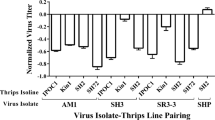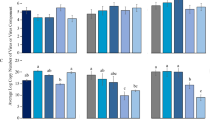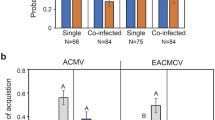Abstract
Two years ago, there was discovered in a commercial glasshouse in Cardiff a plant of Solanum capsicastrum which was affected with a virus disease in which the symptoms consisted of numerous concentric circles on the leaves. This virus has been investigated at Cambridge; it has been transmitted by artificial means to various hosts, including the tobacco plant, on which it produces a typical ringspot disease.1
This is a preview of subscription content, access via your institution
Access options
Subscribe to this journal
Receive 51 print issues and online access
$199.00 per year
only $3.90 per issue
Buy this article
- Purchase on Springer Link
- Instant access to full article PDF
Prices may be subject to local taxes which are calculated during checkout
Similar content being viewed by others
References
Smith, Kenneth M., Ann. Appl. Biol., 18 No. 1.
Samuel, G., Bald, J. G. and Pittman, H. A., Bull. 44, Coun. Sci. Indust. Res. Australia.
Doolittle, S. P. and Sumner, C. B., Phytopath., 21, No. 1.
Author information
Authors and Affiliations
Rights and permissions
About this article
Cite this article
SMITH, K. Thrips tabaci Lind. as a Vector of Plant Virus Disease. Nature 127, 852–853 (1931). https://doi.org/10.1038/127852a0
Issue Date:
DOI: https://doi.org/10.1038/127852a0
This article is cited by
-
Hypersensitivity to viruses A and X in Canadian and American potato varieties
American Potato Journal (1961)
-
Detection of Spotted Wilt Virus in Chrysanthemums
Nature (1936)
-
A New Virus Disease of Tomatoes
Nature (1935)
-
Possibilities in plant virus classification
The Botanical Review (1935)
-
Virusziekten van de tomaat
Tijdschrift Over Plantenziekten (1935)
Comments
By submitting a comment you agree to abide by our Terms and Community Guidelines. If you find something abusive or that does not comply with our terms or guidelines please flag it as inappropriate.



